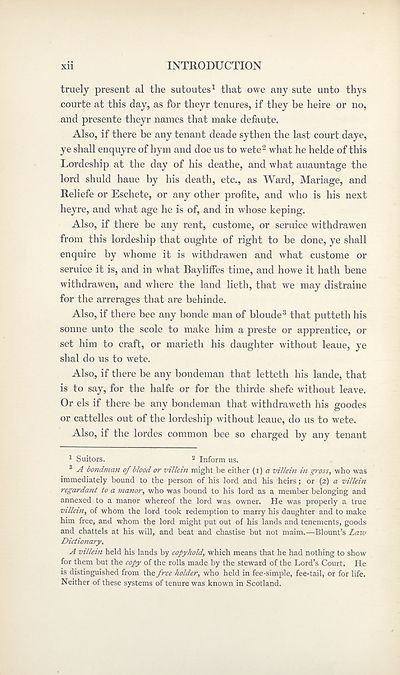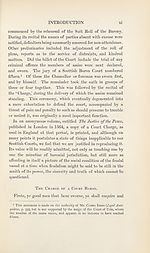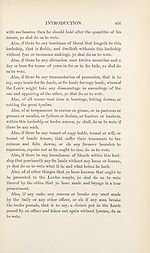Download files
Complete book:
Individual page:
Thumbnail gallery: Grid view | List view

INTRODUCTION
xii
truely present al the sutoutes1 that owe any sute unto thys
courte at this day, as for theyr tenures, if they be heire or no,
and presente theyr names that make defaute.
Also, if there be any tenant deade sythen the last court daye,
ye shall enquyre of hym and doe us to wete2 what he helde of this
Lordeship at the day of his deathe, and what auauntage the
lord shuld haue by his death, etc., as Ward, Manage, and
Reliefe or Eschete, or any other profite, and who is his next
heyre, and what age he is of, and in whose keping.
Also, if there be any rent, custome, or seruice withdrawen
from this lordeship that oughte of right to be done, ye shall
enquire by whome it is withdrawen and what custome or
seruice it is, and in what Bayliffes time, and howe it hath bene
withdrawen, and where the land lieth, that we may distraine
for the arrerages that are behinde.
Also, if there bee any bonde man of bloude3 that putteth his
sonne unto the scole to make him a preste or apprentice, or
set him to craft, or marieth his daughter without leaue, ye
shal do ns to wete.
Also, if there be any bondeman that letteth his lande, that
is to say, for the halfe or for the thirde shefe without leave.
Or els if there be any bondeman that withdraweth his goodes
or cattelles out of the lordeship without leaue, do us to wete.
Also, if the lordes common bee so charged by any tenant
1 Suitors. 2 Inform us.
3 A bondman of blood or villein might be either (i) a villein in gross, who was
immediately bound to the person of his lord and his heirs; or (2) a villein
regardant to a manor, who was bound to his lord as a member belonging and
annexed to a manor whereof the lord was owner. He was properly a true
villein, of whom the lord took redemption to many his daughter and to make
him free, and whom the lord might put out of his lands and tenements, goods
and chattels at his will, and beat and chastise but not maim.—Blount’s Law
Dictionary.
A villein held his lands by copyhold, which means that he had nothing to show
for them but the copy of the rolls made by the steward of the Lord’s Court. He
is distinguished from the free holder, who held in fee-simple, fee-tail, or for life.
Neither of these systems of tenure was known in Scotland.
xii
truely present al the sutoutes1 that owe any sute unto thys
courte at this day, as for theyr tenures, if they be heire or no,
and presente theyr names that make defaute.
Also, if there be any tenant deade sythen the last court daye,
ye shall enquyre of hym and doe us to wete2 what he helde of this
Lordeship at the day of his deathe, and what auauntage the
lord shuld haue by his death, etc., as Ward, Manage, and
Reliefe or Eschete, or any other profite, and who is his next
heyre, and what age he is of, and in whose keping.
Also, if there be any rent, custome, or seruice withdrawen
from this lordeship that oughte of right to be done, ye shall
enquire by whome it is withdrawen and what custome or
seruice it is, and in what Bayliffes time, and howe it hath bene
withdrawen, and where the land lieth, that we may distraine
for the arrerages that are behinde.
Also, if there bee any bonde man of bloude3 that putteth his
sonne unto the scole to make him a preste or apprentice, or
set him to craft, or marieth his daughter without leaue, ye
shal do ns to wete.
Also, if there be any bondeman that letteth his lande, that
is to say, for the halfe or for the thirde shefe without leave.
Or els if there be any bondeman that withdraweth his goodes
or cattelles out of the lordeship without leaue, do us to wete.
Also, if the lordes common bee so charged by any tenant
1 Suitors. 2 Inform us.
3 A bondman of blood or villein might be either (i) a villein in gross, who was
immediately bound to the person of his lord and his heirs; or (2) a villein
regardant to a manor, who was bound to his lord as a member belonging and
annexed to a manor whereof the lord was owner. He was properly a true
villein, of whom the lord took redemption to many his daughter and to make
him free, and whom the lord might put out of his lands and tenements, goods
and chattels at his will, and beat and chastise but not maim.—Blount’s Law
Dictionary.
A villein held his lands by copyhold, which means that he had nothing to show
for them but the copy of the rolls made by the steward of the Lord’s Court. He
is distinguished from the free holder, who held in fee-simple, fee-tail, or for life.
Neither of these systems of tenure was known in Scotland.
Set display mode to:
![]() Universal Viewer |
Universal Viewer | ![]() Mirador |
Large image | Transcription
Mirador |
Large image | Transcription
Images and transcriptions on this page, including medium image downloads, may be used under the Creative Commons Attribution 4.0 International Licence unless otherwise stated. ![]()
| Scottish History Society volumes > Series 1 > Court book of the Barony of Urie in Kincardineshire, 1604-1747 > (23) Page xii |
|---|
| Permanent URL | https://digital.nls.uk/127724001 |
|---|
| Attribution and copyright: |
|
|---|
| Description | Over 180 volumes, published by the Scottish History Society, containing original sources on Scotland's history and people. With a wide range of subjects, the books collectively cover all periods from the 12th to 20th centuries, and reflect changing trends in Scottish history. Sources are accompanied by scholarly interpretation, references and bibliographies. Volumes are usually published annually, and more digitised volumes will be added as they become available. |
|---|


